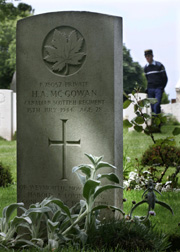 Sixty
years after Allied forces launched their assault on German troops
on D-Day, the monumental battle for
the Normandy beaches is living up to
the historians' maxim that the past isn't what it used to be.
Sixty
years after Allied forces launched their assault on German troops
on D-Day, the monumental battle for
the Normandy beaches is living up to
the historians' maxim that the past isn't what it used to be.
The anniversary celebrations on June 6 will bring together wartime
victors United States and Britain and their former enemy Germany,
smaller Allied nations whose soldiers were there on D-Day and
a big one whose weren't -- Russia.
They won't all look back on "the longest day" as mainly
a triumph of Allied military might. The Germans now talk about
it as the dawn of their liberation from Nazism. Russians tend
to rank D-Day below their 1943 victory at Stalingrad.
But with time moving on and veterans dying off, the daring invasion
is settling back into the annals
of historical events whose meaning can be moulded in
the light of subsequent events.
French President Jacques Chirac set the tone for the 60th anniversary
commemoration in January by saying it would stress "this
community of values that unite democracies and transcend yesterday's
rivalries" and announced Germany would attend.
Chancellor Gerhard Schroeder told reporters that it was only
right that Germany should take part because it was also liberated
from Nazi tyranny thanks to D-Day.
"This day is much more than victory or defeat," he
said. "This invitation shows the post-war period is over
and done for good."
Some US and British veterans' groups have frowned on the invitation,
which President Francois Mitterrand could not extend to Chancellor
Helmut Kohl for the 50th anniversary in 1994 because it could
have offended the ageing survivors.
(Agencies)
